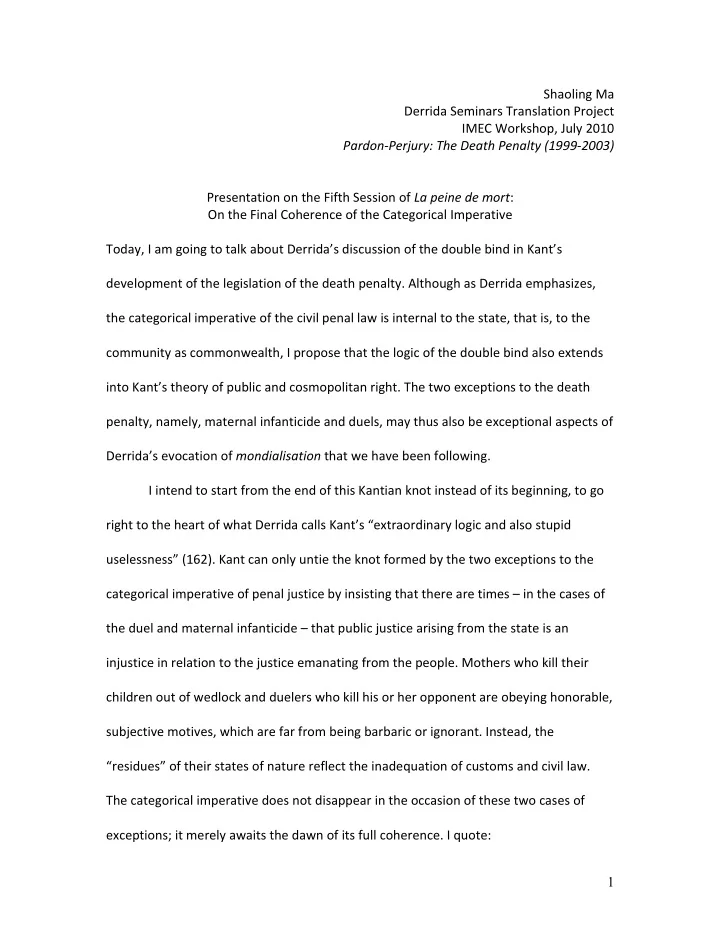

Shaoling Ma Derrida Seminars Translation Project IMEC Workshop, July 2010 Pardon‐Perjury: The Death Penalty (1999‐2003) Presentation on the Fifth Session of La peine de mort : On the Final Coherence of the Categorical Imperative Today, I am going to talk about Derrida’s discussion of the double bind in Kant’s development of the legislation of the death penalty. Although as Derrida emphasizes, the categorical imperative of the civil penal law is internal to the state, that is, to the community as commonwealth, I propose that the logic of the double bind also extends into Kant’s theory of public and cosmopolitan right. The two exceptions to the death penalty, namely, maternal infanticide and duels, may thus also be exceptional aspects of Derrida’s evocation of mondialisation that we have been following. I intend to start from the end of this Kantian knot instead of its beginning, to go right to the heart of what Derrida calls Kant’s “extraordinary logic and also stupid uselessness” (162). Kant can only untie the knot formed by the two exceptions to the categorical imperative of penal justice by insisting that there are times – in the cases of the duel and maternal infanticide – that public justice arising from the state is an injustice in relation to the justice emanating from the people. Mothers who kill their children out of wedlock and duelers who kill his or her opponent are obeying honorable, subjective motives, which are far from being barbaric or ignorant. Instead, the “residues” of their states of nature reflect the inadequation of customs and civil law. The categorical imperative does not disappear in the occasion of these two cases of exceptions; it merely awaits the dawn of its full coherence. I quote: 1
“If the categorical imperative – which remains ( bleibt ) in any case – is one day to be agreement with customs, then culture, non‐barbarity, and civilization are necessary, which is to say: it would be necessary for women no longer to have children out of wedlock and for there to be no more cause for dueling, for the sense of honor to be respected in fact by morality; then the knot will be untied […] In other words … when the history of morality and of civil society will have progressed to the point where there is no more discord between subjective motives and the objective rules, then the categorical imperative that presides over the death penalty will be fully coherent, with neither cruelty nor indulgence, but of course, there will be no more need to sentence to death” (163). And we might add – there will be no more need for the abolition of the death penalty. I am aware that in the second half of the seminar which we have not read, Derrida asks the quintessential question: so what , so what if we no longer have in practice the death penalty? This question does not just undo the simplistic division between the proponents and opponents of the death penalty, and that between life and death itself. Most of all, it undermines the teleological presuppositions of eventually arriving at the proper of man, or which comes down to the same thing, the proper of God. In Kant’s case, the untying of the capital knot will mean the final triumph of the homo noumenon over the homo phaenomenon . The final coherence of the categorical imperative as imagined through the two exceptions to penal civil justice also means the ultimate reconciliation of the two parts of the human. My suspicion is that to truly understand the limits of such a “final coherence of the categorical imperative” that may be thought of Kant’s version of a utopian society, it is not enough to remain within national sovereignties or boundaries, precisely because Kant specifies, and Derrida stresses on this, that the categorical imperative of the civil penal law is internal to the state. Precisely because the child born out of wedlock is said 2
to be outside the law and hence outside of the commonwealth (Kant’s words were: “stolen into the commonwealth like contraband merchandise,” qtd. in Derrida 159), to think the limits of the final coherence of the categorical imperative demands that we push the exteriority of the exception to its furthest possible outside. If we can think the exception to the categorical imperative not as an accidental outside but as its requisite, necessary exteriority, there is absolutely no guarantee that the categorical imperative of the civil penal law would, without fail, be contained to the state. Perhaps one attraction of any philosophy of exteriority is its simple geographical or spatial dimension. Therefore my question is this: as part of Kant’s larger moral philosophy, what does such an impossible scenario signify for men in general, for the relation between individuals and for the notion of people at large? To attempt to answer this, I turn to Kant’s theory of cosmopolitan law, which must be said, is not concerned with the relation between states but with status of individuals in their dealings with states of which they are not citizens. Hence even though Derrida’s discussion of Kant in session five concerns civil penal justice within the state, the concept of public right from the Metaphysics of Morals includes not only political right but also international right. To repeat from this session, the perfect scenario of the full coherence of the categorical imperative arises when public justice accord with the justice of the people. Whereas the people [ Volk ] owes its existence only to the sovereign’s legislation, maternal infanticides and duels seem to prove the exception to the sovereign. 3
Recommend
More recommend